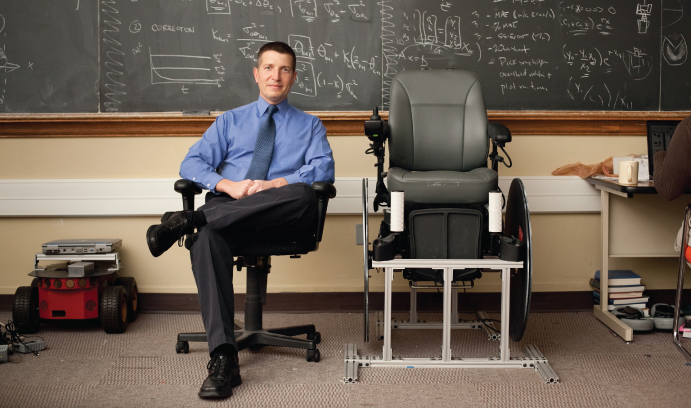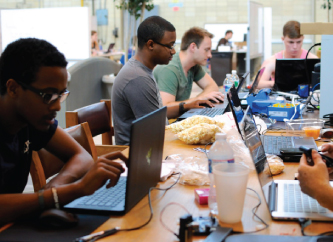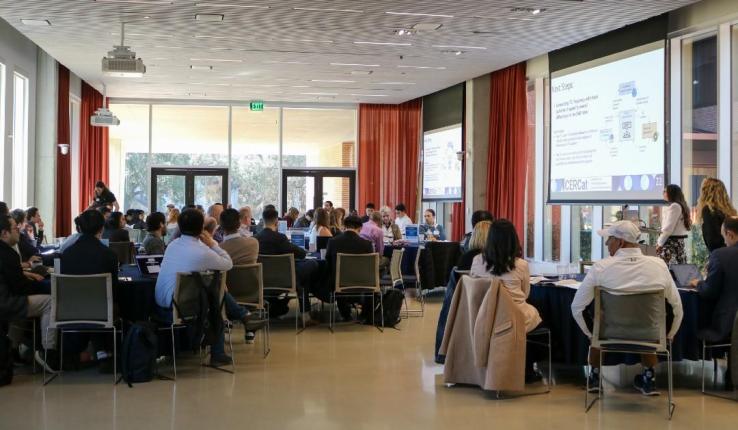Mountaintop Mentor - John Spletzer

A car that drives without a human driver, using lasers and sensors to respond dynamically to its environment.
A system that allows wheelchair users to get into and out of their vehicles, stow and retrieve their chairs, and drive while sitting in traditional auto seats that meet federal safety regulations.
A smart wheelchair that navigates on its own, with no human guidance, transporting users along city streets while avoiding stationary objects and adjusting to pedestrians and bicyclists.
And a small aircraft that studies climate change and tracks weather patterns as it glides endlessly through the jet stream, consuming no energy and again, requiring no human intelligence.
These are just some of the ways in which John Spletzer practices the art of engineering. Spletzer, associate professor of computer science and engineering, is director of Lehigh’s Vision, Assistive Devices, and Experimental Robotics Laboratory, or VADER Lab, for short.
This summer, Spletzer is mentoring two teams of students who are seeking to extend “intelligence” from vehicles to spaces. How can an intelligent living space sense and respond to your mood? How can it respond to collective behaviors? The 20 students in the project will make use of 3-D augmented reality, ambient intelligence, computer vision, embedded devices, mobile computing, networking and wecurity, robotics, and user interface design.
Here, Spletzer shares his thoughts on Mountaintop and the opportunities it is providing his students.
How/why did you get involved with this project/these students?
A year or so ago, I got an alumni email from University of Pennsylvania about Max Mintz – a professor whom I really admire. He is very passionate about undergraduate research. Of course I started reminiscing, so I did a quick search to see what he was up to. Well among other things, he was heading up a National Science Foundation (NSF) Research Experiences for Undergraduates (REU) Site which provides internship opportunities for undergraduates in Penn’s robotics laboratory.
I did a little more digging about NSF REU Sites and thought it would be great to get one at Lehigh in computer science. However, awards are very competitive. Fortunately we were able to catalyze our research around the Mountaintop experience and proposed “The Lehigh Smart Spaces Project.” The idea was well received at NSF and in April 2014, we were awarded a grant of $340K for which I am Principal Investigator. The grant funds ten summer intern positions per year for the next three years. When combined with the interns supported by Lehigh, our department has roughly twenty students working at Mountaintop this summer.
What value does the space/approach to learning at Mountaintop do for this project in particular?
I’ve heard analogies to how things are set up to emulate Google or Facebook, but I view it a little bit differently — it reminds me of cooperative start-up spaces where you have a host of small start-up companies collected in the same space. One obvious benefit to this arrangement is the sharing of physical resources. However, the biggest benefit is leveraging the *people* resources. With over 100 researchers in one space, there’s a lot of intellectual diversity. We encourage the students to take advantage of it. Walk around. Talk to other groups. It’s amazing how much can be learned.
What challenges do you think your team will encounter during their project?
The biggest challenge is time. Everything takes longer than you think, and we only have 10 weeks. The good news is there are mechanisms at Lehigh (internships, independent study research, etc.) to continue the work beyond the summer if the students are interested. So, it doesn’t have to end in the Fall.
Posted on:





